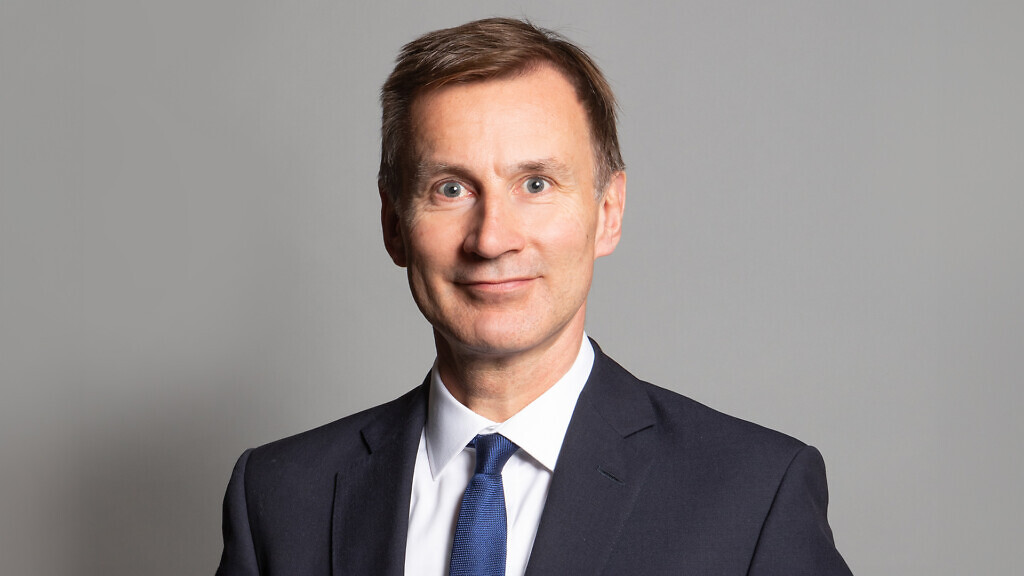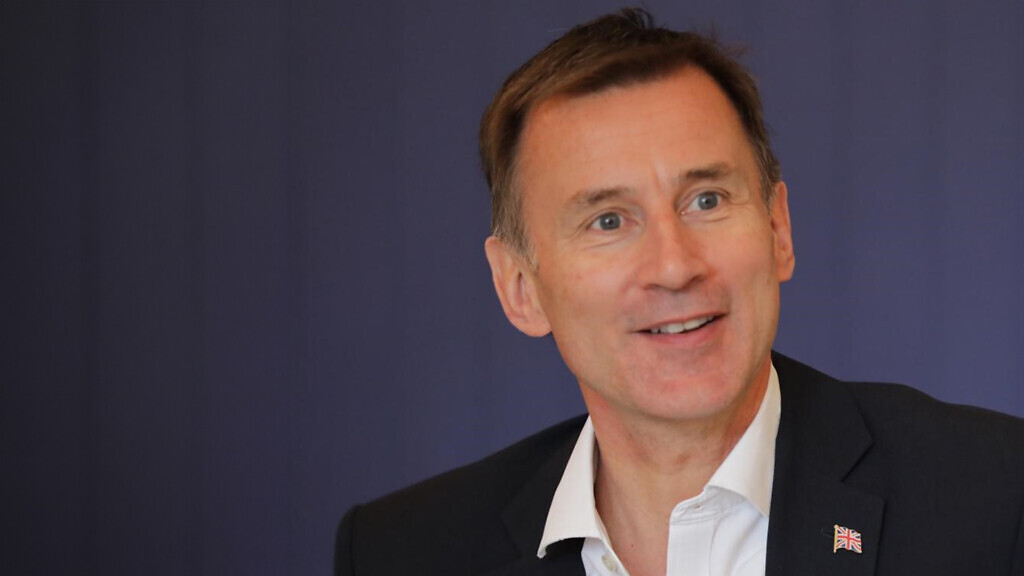The former health secretary explains why he thinks national targets should be scrapped, patients should have their own GPs and the importance of digital transformation.
Speaking just after a meeting of the new All-Party Parliamentary Group (APPG) on Patient Safety which was launched at the end of November and of which he is chair, Jeremy Hunt talked to Healthcare Today about patient safety, a “duty of candour” and the lessons learned from the COVID pandemic. The Health Secretary between 2012 and 2018 considers whether learning, candour and change can really happen in an environment with a generally hostile popular media and a parliament that seems more antagonistic than collaborative and what his priorities would be were he health secretary again.
Healthcare Today: Patient safety was the watchword when you were health secretary. Where do you still feel that work needs to be done?
Jeremy Hunt: Patient safety has become an increasingly important issue, partly due to a kind of circularity that has brought it back to the forefront of the agenda. When I became Health Secretary, what became immediately clear to me was that during the Blair and Brown years [Tony Blair and Gordon Brown were Labour British Prime Ministers between 1997 and 2010], the NHS had made significant progress, particularly in reducing waiting times for both elective and emergency care. However, one unintended consequence of the approach taken during that period was the emergence of a “targets culture”. This emphasis on meeting performance metrics sometimes led to corners being cut on safety and quality.
I was determined to preserve the achievements of that era – such as the reduced waiting times championed by figures like Alan Milburn [Health Secretary between 1999 and 2003] – but I also wanted to ensure that the NHS had a standard below which it should never fall. This led me to reform the Care Quality Commission (CQC), shaping it to function more like Ofsted in schools, with a focus on rigorous and consistent oversight.
During my tenure, I frequently spoke about patient safety, but I didn’t see it as separate from quality. Both rely on the same foundational principle: a learning culture. To improve safety and quality, there must be an environment where mistakes are acknowledged, lessons are learned, and practices are improved.
This is especially relevant now. The pandemic has effectively halted NHS reform, leaving us with alarming waiting times for both emergency and elective care. It’s reminiscent of the challenges faced by Labour when they first tackled NHS reforms in the past. The crucial lesson is that as we work to reduce waiting times again – and it’s encouraging to see [Prime Minister] Keir Starmer making this a priority.
While the new government has focused on reducing waiting times, they’ve yet to address emergency care comprehensively. As this winter is projected to be even more challenging than the last, that issue will inevitably demand attention.
“My advice to Wes Streeting is simple: scrap as many national targets as possible.”
Healthcare Today: You’ve often talked in the past about learning from healthcare systems like those in Sweden and the US in particular. What policies and practices do you think the NHS should adopt?
Jeremy Hunt: We’re not just living in a post-COVID world; we’re also in a political landscape shaped by a Labour government with a strong majority. The NHS is at the top of their agenda and there’s a broad consensus that the system requires bold reforms. This is a rare moment. When I was Health Secretary, the guidance I received from Number 10 was clear: keep things quiet, avoid rocking the boat, and ensure the NHS remained out of the headlines. In contrast, Wes Streeting appears to have a much stronger mandate for radical change.
There are long-standing issues I believe we must address. One critical area is fostering a low-blame culture, similar to what exists in Sweden. There, clinicians are encouraged to be open about mistakes, creating opportunities for learning and improvement without fear of legal repercussions. The process is far less adversarial, with lawyers playing a minimal role. This kind of cultural shift would be transformative for the NHS.
Beyond culture, there are structural challenges that need urgent attention. One of the core problems is the pervasive “targets culture”, which has led to the NHS becoming the most micro-managed healthcare system in the world. This over-regulation has left the system paralysed, stifling innovation and making it nearly impossible to establish a culture of continuous learning.
We’ve seen this dynamic overcome in other sectors. In education, we’ve granted headteachers significant autonomy, which has fostered innovation and driven standards in English state schools to world-class levels. Similarly, scrapping national police targets has allowed forces to focus on what works locally, contributing to falling crime rates. The lesson here is clear: excessive central control undermines progress.
So why do hospitals in the UK struggle compared to those in countries like the US, the Netherlands, France, or Germany? The answer lies in the heavy burden of managing upwards. The NHS is the only healthcare system in the world that actively prevents localised innovation by maintaining rigid national targets. My advice to Wes Streeting is simple: scrap as many national targets as possible.

Healthcare Today: That is an interesting point about linking patient safety to other elements. It is often connected with the “duty of candour” that you brought into the NHS. Do you think it is still being implemented properly?
Jeremy Hunt: During my tenure, I approached patient safety with an all-encompassing mindset, implementing nearly every reform that was recommended. Among these reforms, the one that likely had the most significant impact was empowering the CQC to conduct independent ratings of healthcare providers. Safety became one of their five core domains. That initiative created a level of focus on patient safety that had never existed before.
The introduction of the duty of candour was another important reform. This legal obligation requires hospitals to be transparent with patients and their families when mistakes occur, particularly in cases of serious harm or death. Because the hospital board is legally accountable, this reform has significantly reduced the egregious cover-ups that once happened. Today, hospitals are far more cautious about concealing errors, knowing the potential consequences.
However, the duty of candour stops at the institutional level. While it was extended to individual clinicians through changes in their professional codes of conduct, I was advised against making it a legal requirement for doctors and nurses. In hindsight, I’m still uncertain about whether this was the right approach. Cultural change may ultimately be more effective than legislative measures. The key is creating supportive environments in which clinicians feel safe to acknowledge mistakes and speak up without fear of reprisal.
“To be clear, I wouldn’t describe junior doctors as a group as militant. But certain individuals within the leadership of the BMA’s Junior Doctors Committee were undeniably combative.”
Healthcare Today: Do you really think that learning, candour and change can really happen in an environment with a generally hostile popular media and a parliament that seems more antagonistic than collaborative?
Jeremy Hunt: The role of the Health Secretary is to set the tone for the entire system. Every Health Secretary embarks on a learning journey. Early on, it’s tempting to believe that firing bad managers or bad doctors is the solution to systemic issues. As time went on, I came to realise that approach is counterproductive. It fosters a climate of fear, which is the opposite of what’s needed to create a culture of learning and continuous improvement.
What you really want is for people to feel safe enough to be honest about their mistakes. The most inspirational leaders I’ve encountered are those who openly admit when they’ve made an error. It takes a great deal of confidence to lead like that. For politicians, this kind of humility is almost impossible due to the way the media operates.
That said, I did find moments as Health Secretary where I could challenge the punitive instinct without much backlash. For instance, I stood up for Dr. Hadiza Bawa-Garba in her case and didn’t face significant pushback.
The comparison to the airline industry might be overused, but it remains relevant. The safety culture they’ve developed – one that makes it easy for pilots to speak up about concerns – has been transformative. I firmly believe we can achieve a similar culture in the NHS, where openness and accountability drive real improvements in patient safety.

Healthcare Today: Language is part of it, and the rhetoric against what used to be called junior doctors, now resident doctors, very much started under the last government. You yourself referred to them as “militant”. Do you regret that type of rhetoric?
Jeremy Hunt: I don’t want to be overly defensive about my time in office, however, in the case of the junior doctors’ dispute, the situation was particularly challenging. The British Medical Association’s (BMA) Junior Doctors Committee at the time was highly militant, driven by individuals who, in my view, had a strong political agenda. For instance, during the pay dispute leading up to the general election, the committee’s leader openly rejected a deal offered to junior doctors in England that was identical to the one accepted in Scotland. If that wasn’t politically motivated, I’m not sure what was.
To be clear, I wouldn’t describe junior doctors as a group as militant. But certain individuals within the leadership of the BMA’s Junior Doctors Committee were undeniably combative. This was not the case with the leadership of the BMA’s Consultants Committee, nor did I get the same impression from the national BMA leadership. Unfortunately, the confrontational approach of some in the junior doctors’ leadership poisoned relations and made meaningful progress almost impossible.
This was deeply regrettable because junior doctors are among the most vital members of the NHS workforce. They work some of the most demanding hours and face immense pressure in their roles. The NHS depends on them, and it’s a shame that the adversarial dynamics during that period created such significant challenges.

Healthcare Today: To cut through all of these questions – is the answer just money? Does the NHS just need more cash?
Jeremy Hunt: The issue facing the NHS isn’t about funding anymore. There’s a strong case to be made that, during my tenure as Health Secretary, the NHS needed additional resources, which is why I negotiated a £20 billion increase in its annual budget. However, when you compare the NHS to other healthcare systems globally, it’s now one of the most well-funded systems. Among the 38 OECD countries, the UK ranks fifth in healthcare spending as a proportion of GDP. Since the pandemic, NHS funding has risen significantly, and even before the upcoming election, Labour hasn’t framed the NHS’s problems as financial.
That said, I do believe social care requires more investment, as deficiencies there have a direct impact on the NHS. But beyond funding, the NHS faces significant structural challenges that must be addressed. One of the most critical reforms we need is to return to the system where GPs have their own patient lists. This approach, which is standard in most other countries, is supported by substantial evidence. International studies show that patients with a regular GP are 30% less likely to require hospital care, 25% less likely to die prematurely, and far less likely to be misdiagnosed.
When GPs have a personal connection with their patients and their families, they gain valuable contextual knowledge that improves clinical decision-making. Unfortunately, since the 2004 contract changes, we’ve moved away from this model. Patients are now attached to surgeries rather than individual doctors, effectively transforming GP practices into call centres. Doctors often see 40 patients a day, many of whom they’ve never met before. This is not only detrimental to the quality of care but also far more stressful for doctors, who are under pressure to make quick decisions without the benefit of prior knowledge or rapport.
Reintroducing personal patient lists is an obvious and necessary reform.

Healthcare Today: We can’t leave you without talking about COVID. Are there any lessons since the COVID pandemic, that you feel the system has failed to implement effectively?
Jeremy Hunt: There’s still so much more to be done. The NHS performed magnificently during COVID, and the dedication of its staff was truly extraordinary. However, this success came at a significant cost to non-COVID healthcare. To free up capacity for the pandemic, the NHS largely halted non-COVID care. This approach allowed us to ensure that everyone who needed an intensive care bed or ventilator received one, but it has left us with enormous waiting lists for cancer treatment and elective surgeries – issues that other countries have largely avoided.
While our centralised system enabled rapid and decisive action, it also exposed vulnerabilities in our capacity planning for non-COVID care. This is a critical lesson we must address moving forward.
Beyond capacity issues, the most pressing reforms are needed in public health. During the pandemic, we were fortunate to have existing research on coronaviruses from severe acute respiratory syndrome (SARS) and Middle East respiratory syndrome (MERS), which allowed us to develop a vaccine within a year. But many other viruses lack that kind of head start, and we could also face bacterial pandemics. The risks of global pandemics are increasing due to globalisation, and the idea of a “once-in-a-century” pandemic may now be more like once every decade or two.
I’m concerned that we’ve taken our eye off the ball when it comes to pandemic preparedness. The focus has shifted to other pressing issues like Ukraine and global political tensions, which are undoubtedly important. However, we must not lose sight of the fact that another pandemic is not just possible – it’s likely.
“One of the reasons NHS productivity lags behind other sectors is its failure to embrace digital advancements fully.”
Healthcare Today: If you were a health secretary again, what would your three priorities be? What would you focus on?
Jeremy Hunt: If I were to outline my priorities, I would start by scrapping national targets and empowering local leaders – specifically the 42 Integrated Care Board (ICB) chief executives and the 250 hospital trusts – to drive innovation in their own regions. While I would remove the rigid national targets, I would maintain a commitment to transparency by measuring and publishing key performance data. For instance, I firmly believe that everyone should receive treatment for elective conditions within 18 weeks and that no one should wait more than four hours in A&E. Publishing this information would ensure accountability and make it clear which hospitals are meeting these standards, and which are not.
Another critical reform would be returning to a system where patients have their own GPs. This change would be a cornerstone of primary care transformation, ensuring continuity of care and better outcomes for patients.
Finally, I would prioritise digital transformation. One of the reasons NHS productivity lags behind other sectors is its failure to embrace digital advancements fully. There is a tremendous opportunity here to enhance efficiency, such as increasing the number of daily surgeries performed by surgeons and redirecting patients to pharmacists for care that doesn’t require a GP’s attention. Additionally, the NHS app could be utilised far more effectively to streamline services and improve patient access.



